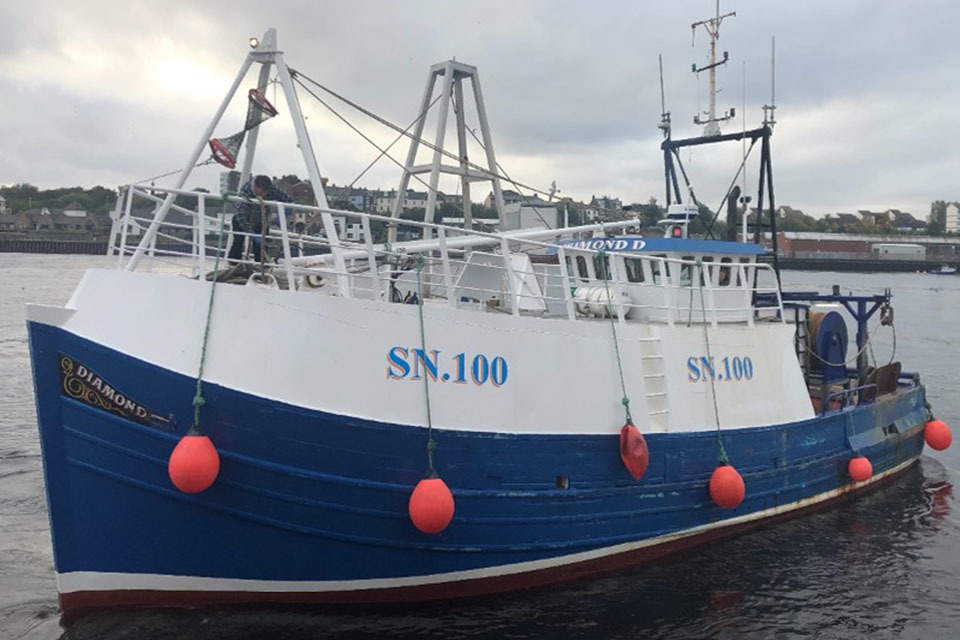Safety flyer to the fishing industry - Diamond D
Published 9 February 2022
1. Summary
Flooding, capsize and foundering of the trawler Diamond D (SN100) north-east of Tynemouth, England, on 16 August 2020

The prawn trawler Diamond D
2. Narrative
At about 1500 on 16 August 2020, the wooden-hulled 15.67m fishing vessel Diamond D capsized and sank after suffering hull damage and subsequent water ingress while trying to uncross its towing wires.
Diamond D was on a relocation voyage when the two crew decided to undertake a trawl before arrival into the River Tyne. While fishing, they picked up a heavy object in the net and accidentally crossed the towing wires. The crew spent several hours working on deck, attempting to uncross the towing wires, haul the net on board and free the heavy object. During this process the trawl doors were heard hitting the hull several times; it is likely that this caused hull planks or caulking to become dislodged. Despite working on deck for a prolonged period neither crewman wore a personal flotation device (PFD). The wheelhouse was left unattended and the bilge alarms, which would have alerted the crew to the flooding, were not noticed until it was too late to take remedial action. The crew grabbed lifejackets and the vessel’s Emergency Position Indicating Radio Beacon (EPIRB), launched the liferaft and managed to abandon the vessel as it capsized. The EPIRB provided the rescue services with an accurate location and, about 1 hour later, they were rescued unharmed.
3. Safety Lessons
-
To undertake fishing operations safely, the vessel was normally operated by three crew. The change of plan, from undertaking a delivery voyage only to then trawl for fish, meant that there was nobody available to man the wheelhouse while the other crew were working on deck, or to check for damage after the trawl doors hit the hull. The change of plan introduced additional risks that were normally mitigated by the provision of a third crewman. Any change of agreed plans or deviation from a standard operation should involve a brief step back and a reassessment of the risks. Had this been done, the decision to fish with reduced crew might not have been taken, and the vessel might not have been lost.
-
All unattended spaces should be regularly checked. Had the internal spaces or the wheelhouse been checked periodically, the crew might have noticed the flooding, or the sounding of the bilge alarms warning of the flooding. Additional pumping capacity could then have been brought into action to control the volume of water flooding on board.
-
Neither of the crew was wearing a PFD while working on deck. During the abandonment, the skipper ended up in the water without a PFD and was lucky not to have succumbed to the debilitating effects of immersion in the cold seawater. Because he was not wearing a lifejacket, had he not been quickly pulled out of the water into the liferaft it is possible that he would have drowned. If you do fall or jump into the water, wearing a lifejacket improves your chance of survival because it keeps you afloat.
-
The crew’s activation of the EPIRB led directly to their timely rescue. This highlights the importance of being familiar with how to use the emergency equipment on board your vessel.
Our accident investigation report is available at: https://www.gov.uk/maib-reports/flooding-capsize-and-sinking-of-prawn-trawler-diamond-d.
Extract from The United Kingdom Merchant Shipping (Accident Reporting and Investigation) Regulations 2012 – Regulation 5:
The sole objective of the investigation of an accident under the Merchant Shipping (Accident Reporting and Investigation) Regulations 2012 shall be the prevention of future accidents through the ascertainment of its causes and circumstances. It shall not be the purpose of an such investigation to determine liability nor, except so far as is necessary to achieve its objective, to apportion blame.
Note:
This safety flyer is not written with litigation in mind and, pursuant to Regulation 14(14) of the Merchant Shipping (Accident Reporting and Investigation) Regulations 2012, shall be inadmissible in any judicial proceedings whose purpose, or one of whose purposes is to attribute or apportion liability or blame.
Marine Accident Investigation Branch
First Floor, Spring Place
105 Commercial Road
Southampton
SO15 1GH
Email iso@maib.gov.uk
Enquiries during office hours +44 (0)23 8039 5500

